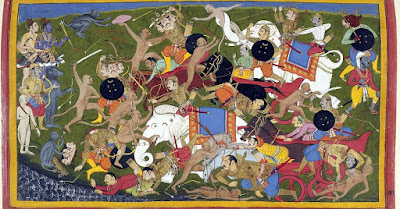CHRISTOPHER MARLOWE: A BRIEF STUDY
Born in Canterbury to a shoemaker, Christopher Marlowe, also known as Kit Marlowe ( 1564-1593), was an English playwright, poet and translator of the Elizabethan era. He is considered the best among the University Wits. It is also said that Marlowe was operating as a secret agent and has served the government in that capacity. A warrant was issued against him alleging blasphemy on 18 May 1593. Ten days later he was stabbed to death by Ingram Frizer.
PLAYS
- Foremost Elizabethan tragedian
- He greatly influenced Shakespeare who was born in the same year as he
- Plays are known for the use of Blank verse. In fact, the blank verse was first used in his plays.
- Overreaching protagonist
- Dido, the Queen of Carthage
- Published in 1594, it is believed to have been his first play. It was performed by the Children of Chapel between 1587-93.
- The title page attributes the play to Marlowe and Thoams Nashe.
- The story focuses on the classical figure Dido and her obsessed love for Aeneas, his betrayal of her and her eventual suicide on his departure to Italy.
- Books 1, 2 and 4 of Virgil's Aeneid are the main source.
- Tamburlaine the Great
- A play in two parts.
- It was Marlowe's first play to be performed on the regular stage in London, in 1587.
- It is among the first plays to be written in blank verse.
- It is about the conqueror Timur rises to be a conqueror from a Scythian Shepherd. It is loosely based on the life of the Central Asian Emperor.
- Tamburlaine the Great along with Kyd's Spanish Tragedy marks the mature phase of the English stage,
- Part 1- Setting - Persepolis, Scythia, Africa, Damascus
- Characters- Mycetes, Cosroe, Bajazeth and his wife Zabina, Egyptian Sultan
- The play ends with the wedding of Tamburlaine and Zenocrate, who is crowned the Empress of Persia
- Part 2- Setting-Babylon
- Characters- Callapine, son of Bajazeth
- Tamburlaine kills his son Calyphus for remaining in the tent during the battle.
- His savagery reach heights when he burns a copy of Quran
- The Jew of Malta(1589-90)
- Published posthumously
- Setting- Backdrop of the struggle for supremacy between Spain and the Ottoman Empire in the Mediterranean that takes place on the island of Malta.
- Controversial for its portrayal of Jews
- A major influence on Shakespeare's Merchant of Venice.
- The play contains a prologue in which the character Machiavel, a Senecan ghost based on Niccolo Machiavelli, introduces " the tragedy of a Jew."
- The play begins in Barabas's counting-house.
- Other characters- Governor of Malta, Ithamore- Slave, Abigail- Barabas's daughter, Bernadine and Jacomo-Friar, Turkish prince
- The play entered the Stationer's Registers on 17 May 1594
- Edward the Second(1592)
- Full Title- The Troublesome reigne and lamentable death of Edward the second, King of England, with the tragical fall of proud mortimer
- Renaissance play
- Borrowed from Holinshed's Chronicles (1587)
- Homosexual affection- The King and Piers Gaveston
- Characters: Isabella of France, the Queen, Mortimer, Nobles, Lightborn, Edward the Third
- Mortimer is executed for King's murder
- The play entered the Stationer's Register on 6 July 1593
- The Massacre at Paris(1593)
- Full title- The Massacre at Paris: With the Death of the Duke of Guise
- Portrays events of Saint Bartholomew's Day Massacre in 1572.
- Blackest example of Catholic treachery
- It features the English Agent identified as Marlowe and his connections with the Queen's secret service
- Doctor Faustus (1593)
- Full Title: The Tragical History of the Life and Death of Doctor Faustus
- Based on German Faustbuch
- Two versions: 1604 quarto and 1616 quarto
- The first dramatisation of the Faust legend
- Setting: University of Wittenberg
- It entered the Stationer's Register on 18 December 1592
Marlowe's plays are enormously successful because of the imposing presence of Edward Alleyn. Marlowe's plays were the foundation of the repertoire of Alleyn's company, the Admiral's Men, throughout 1590.
- Poetry
- Hero and Leander
- The Passionate Shepherd to his Love
- Translation
- Ovid's Amores
- Lucan's Pharsalia



Comments
Post a Comment